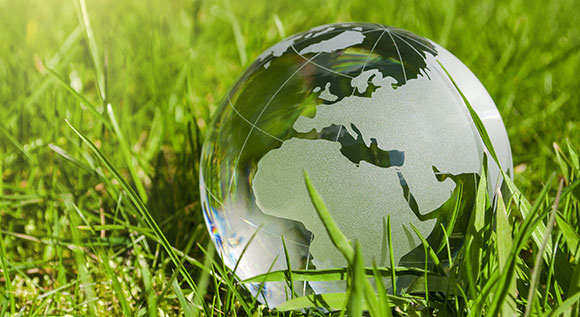The international side of the energy transition
For more than ten years, Germany has been maintaining energy partnerships and energy dialogues with countries across the world. These formats give a boost to the global energy transition and mutual learning, and they give rise to solutions tailored to the needs of individual countries.
 © AdobeStock / Stockwerk-Fotodesign
© AdobeStock / Stockwerk-Fotodesign
2019 was an important year for the global energy transition. Renewables account for a growing share of the global power supply, now making up more than a quarter of the electricity used across the globe. 2019 was yet another year when more new renewables capacity was added than fossil-fuel and nuclear capacity combined. The global uptake of renewables is no longer dependent on just a few countries in the world. The use of renewables continued to grow steadily across the world in 2019.
Germany is a pioneer in terms of its energy transition and was able to reach a new record share of renewables in 2019, with these now making up almost 43 per cent of the country's power supply. At the same time, power consumption in Germany fell to a 20-year low. These are some of the reasons why there is so much interest in Germany's energy transition and in maintaining close dialogue between policy-makers, business, science and academia, and civil society. Ten years after they were first launched, our international energy partnerships have a pretty impressive record:
Many partners, one shared goal: this is how energy partnerships work
Germany is now working closely with more than 20 partner countries to make the global energy transition a success. The results can be found in the latest Annual Report on the energy partnerships and energy dialogues. The declared goal of this cooperation is to shape a successful, global energy transition that delivers energy security together with competitiveness and effective mitigation of climate change. In their energy partnerships, Germany and its partner countries tackle important questions linked to energy policy together. These partnerships are the most important tool for the Federal Ministry for Economic Affairs and Energy, which is responsible for Germany's foreign energy policy, and they are a forum for intergovernmental debate on energy policy. All this work is based on an MoU signed by both sides. Energy dialogues, by contrast, serve the same purpose, but in the absence of an MoU. In this case, the issues to be covered and specific activities are agreed jointly by the partners involved.
Opportunities, challenges, and strategies of the global energy transition are discussed via a number of different channels and platforms. These include regular working group meetings, workshops, bilateral talks, delegation visits, and various virtual formats. Items discussed in these forums include the expansion of renewables, network and systems integration, electricity market design, strategies for sustainable hydrogen production and other ways of storing energy, exit strategies for coal, energy audits and energy-efficient buildings, the expansion of the power grid, cybersecurity, and blockchain. Also on the agenda are more general issues such as how structural change can be shaped in a way that is socially accepted and questions relating to local effects on the economy and jobs. Furthermore, the energy partnerships create and promote a global expert network.
From Algeria to Ukraine – More than 20 partner countries involved in the discussions in 2019
At present, Germany has energy partnerships with Algeria, Australia, Brazil, Chile, China, India, Japan, Jordan, Mexico, Morocco, South Africa, South Korea, Tunisia, Turkey, and the United Arab Emirates. On top of that, there are also energy dialogues between Germany and Canada, Iran, Kazakhstan, Russia, Ukraine, and the U.S., including some U.S. states. Finally, the Federal Ministry for Economic Affairs and Energy also works with Belarus and Egypt, and has forged an energy cooperation with Ethiopia.
Canada, Chile, and Ethiopia joined the network in 2019. By virtue of its geographical location, Chile, in particular, offers major potential for electricity generated from PV and other renewables. There are plans for closer cooperation on renewables and energy efficiency and also on hydrogen and digitalisation.
Going forward, hydrogen and power-to-x are gaining importance
Trusted discussions on an equal footing and in a spirit of partnership – this is the key to successful bilateral energy cooperation. The Annual Report shows that forward-looking aspects such as digitisation in the energy sector or the role of hydrogen and power-to-x technologies are picking up speed in the global debate. Research into these questions is discussed in all four corners of the world – for instance, there is a background study on hydrogen in Australia, a German-Japanese study comparing the role of hydrogen in the two countries, a power-to-x roadmap is being developed for Morocco, there are discussions with South Korea about hydrogen-based mobility, and a concept for a South African promotional and coordination instituted modelled upon the German National Hydrogen Organisation (NOW). Germany's bilateral energy partnerships play a key role also in the context of Germany's Hydrogen Strategy: they help develop potential supply markets for hydrogen, build trade relationships and foster cooperation between companies.
Country-specific approaches for long-term and sustainable success
The idea is always to support country-specific approaches and to bring trends that have emerged in the partner countries to Germany. Not only does this help foster the expansion of renewables capacity and the roll-out of efficient energy-technology across the globe – it is also an important instrument for a constructive dialogue on political and economic aspects of the energy transition, and a way to support companies working in the energy industry in Germany and in the partner countries. This benefits not only the two partners involved, but also the climate and mankind on the whole.
If you're interested in facts, figures and success stories linked with Germany's international energy partnerships and dialogues, read the 2019 Annual Report (in German only).

